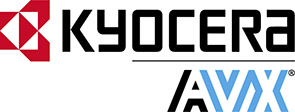Technical documents
Specifications
Brand
AVXCapacitance
10µF
Voltage
16V dc
Package/Case
1210 (3225M)
Mounting Type
Surface Mount
Dielectric
X5R
Tolerance
±20%
Dimensions
3.2 x 2.5 x 2.79mm
Length
3.2mm
Depth
2.5mm
Height
2.79mm
Series
Standard
Minimum Operating Temperature
-55°C
Terminal Type
Surface Mount
Maximum Operating Temperature
+85°C
Product details
AVX 1210 MLCC Series
X7R formulations are called “temperature stable” ceramics and fall into EIA Class II materials, and COG (NPO) is the most popular “temperature-compensating” EIA Class I ceramic materials
Multilayer Ceramic Capacitors whose temperature variation is within ±15% from -55°C to +125°C
The capacitance change is non-linear
AVX high voltage chips have advantages of high value, low leakage and small size, thus applications include as snubbers in high frequency power converters, resonators in SMPS and high voltage coupling/DC blocking
These high voltage chip designs exhibit low ESRs at high frequencies
Stock information temporarily unavailable.
Please check again later.
P.O.A.
Standard
10
P.O.A.
Standard
10
Technical documents
Specifications
Brand
AVXCapacitance
10µF
Voltage
16V dc
Package/Case
1210 (3225M)
Mounting Type
Surface Mount
Dielectric
X5R
Tolerance
±20%
Dimensions
3.2 x 2.5 x 2.79mm
Length
3.2mm
Depth
2.5mm
Height
2.79mm
Series
Standard
Minimum Operating Temperature
-55°C
Terminal Type
Surface Mount
Maximum Operating Temperature
+85°C
Product details
AVX 1210 MLCC Series
X7R formulations are called “temperature stable” ceramics and fall into EIA Class II materials, and COG (NPO) is the most popular “temperature-compensating” EIA Class I ceramic materials
Multilayer Ceramic Capacitors whose temperature variation is within ±15% from -55°C to +125°C
The capacitance change is non-linear
AVX high voltage chips have advantages of high value, low leakage and small size, thus applications include as snubbers in high frequency power converters, resonators in SMPS and high voltage coupling/DC blocking
These high voltage chip designs exhibit low ESRs at high frequencies
